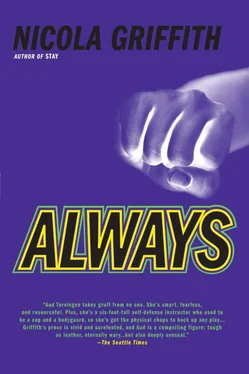“Thank you, no.”
After what had occurred between us, I couldn’t bring myself to force her.
AFTER SHEhad gone, I tidied away the champagne, blew out the candles, and stripped naked. I could smell my own need.
I placed my feet exactly, put my palms together, and reached for the ceiling. I breathed out, slow and controlled, and reached some more, until two vertebrae popped and settled, then I bent to the floor, palms flat, and breathed four smooth breaths, six seconds in, seven seconds out. I began the slow-motion movements of a tai chi form.
When I was done, I began again, even more slowly. And again, until sweat coursed down my body.
LESSON 5
THEY WERE ALL THERE. ALL EXCEPT SANDRA APPEARED HAPPY AND RELAXED:glad for it to be spring at last, finding it easier to travel to a strange part of the city now that it was no longer dark when they arrived, now that they no longer had to be afraid when they got out of their cars.
“Sit for a minute,” I said, and they folded to the floor with varying degrees of ease. Sandra moved more carefully than usual. I wondered what color her torso was. “Let’s talk about fear.”
“Let’s not,” Nina said, and though she was smiling, as usual, she wasn’t joking.
“Fear,” I said, and waited. “What is it?”
“There’s all kinds,” Kim said. I raised my eyebrows. “Like scary movies are good.”
“But being pulled into your supervisor’s office is bad,” Tonya said.
“And worrying that you’re being followed.” Katherine, of course.
“The Goliath at Six Flags is kind of cool.” Suze.
“But thinking you might have cancer isn’t.” Nina.
Silence. “And all these things are fear?”
“Well, yeah.”
“How are they different?”
“Some are good, and some are bad.”
“Why?” Blank looks. “All right. How do you feel when you’re afraid?”
“Frightened,” Nina said in a duh voice.
“How do you know you’re frightened?”
They all stared desperately at the carpet, saying with their entire beings: don’t like this, won’t go there, la la la.
Finally Christie offered, “I shake.”
“Yes,” I said, “and probably your mouth goes dry.”
“Damn,” said Kim, “that’s right.”
“It’s the same for everyone. Fear is a physical response to real danger, immediate danger. It’s glandular and fast as lightning. There’s nothing you can do about it.”
They looked appalled.
“But fear isn’t the enemy. Fear is your friend. It tells you the truth about what’s going on. In that sense, it’s a bit like pain.”
“Pain is not my friend,” Therese said.
“Reliable messenger, then. We don’t always want to hear what it’s got to say, but once it’s arrived, it doesn’t pay to ignore it.”
Pauletta was frowning. “That’s it? I paid good money to hear you say we’re gonna get hurt and scared and there’s nothing we can do about it?”
“That’s not what I’m saying. I’m saying that when you’re in danger, your glands release all kinds of hormones that are instructions your body cannot disobey.”
“So some guy scares us and we run shrieking down the alley, that what you’re saying?”
“No.” I put on my earnest, friendly face. “One of the most important hormones involved in the fear response is adrenaline. Its prime function is to shunt power to necessary systems, basically to make sure you’re ready to fight or run or both. So, Christie, when you tremble, that’s adrenaline flooding your long muscles, your arms and legs, with power. If you’re not running or fighting, you shake, like a shuttle trembling at the launchpad.”
“I’m not a shuttle,” Kim said. “I start to shaking, and the next thing I do is pass out.”
“For real?” Pauletta said.
“Once. Went down, whap, like someone broke my legs. Busted my teeth out on the ground.”
“No shit?”
“Just baby teeth. Loose anyhow.” She shrugged.
Jennifer was breathing far too fast for it to be healthy, and her upper lip glistened. “You pass out? But if you pass out, you’re helpless…. I’m going to buy a gun,” Jennifer said. “I am. A big, big gun.”
“Guns don’t help,” Sandra said. The whole class looked at her.
“Okay,” I said. “All right. I’m going to tell you what happens and what can happen when we’re scared. And then I’m going to show you some ways to get around some of those things. No one has to pass out with fear ever again—”
“You said there’s nothing we can do about it.”
“—and no one has to buy a gun.”
Now I had their attention.
“Fear is an emotion, a glandular reaction. It’s physical. It affects what we do, how we think, and how we feel. Fear is the body’s response to an understanding of real and immediate danger. Remember those key words: real and immediate. Your glands flood your body with a variety of hormones, like adrenaline. Adrenaline instructs your body to rev up the parts and processes essential for you to fight or run, and to shut down the nonessentials. So, for example, the capillaries in your face close, making you go pale. Your digestion—from saliva production to excretion—turns off, so your mouth goes dry.”
“Is that why I get sick to my stomach?” Tonya.
“Yes. You get queasy because your stomach, usually churning away constantly, essentially freezes. Your heart and respiration rates go up—your heart pounds, you feel breathless—to get oxygen, lots of oxygen, to the long muscles of your arms and legs, getting you ready to respond at your maximum. Fear is a good thing.”
“But getting scared isn’t.” Pauletta was stubborn.
“There’s nothing good about being in danger, no.” Except that it means you’re not yet dead. “But fear, when you are already in danger, is a good thing. Adrenaline also affects the way your brain works.”
“Panic,” said Jennifer, nodding.
“Not necessarily. What happens in times of real and immediate danger is that your unconscious brain, a kind of emergency expert system, takes over. Panic is a system conflict. It’s what happens when your conscious and unconscious brain fight.” And melt down, and all sense just runs and hides. That had happened to me for the first time last year, in New York. Tonya was saying something. “I’m sorry.”
“I said, like a robot trying to compute when the scientist says, I always lie.”
Nina made robot-in-a-loop motions, like something from a bad 1980s music video. The tension was beginning to ease.
I blinked. “Yes. Very good. Just like that. And just as a robot in these stories is always naïve, our conscious mind can be, too. It can persuade itself of things an idiot child wouldn’t believe.” I shook off memories of last year. “I’ll come back to that, because it’s important.” It was the heart of everything, but I couldn’t get there from here. “For now, I’d like you to think a bit more about what fear is and where it comes from.”
I stood. They watched warily as I walked to the back of the room and my satchel. Tension was high again. I retrieved the packet of blank three-by -five index cards and the box of Sharpies and handed them out.
“On this card I want you to write the one thing you’re afraid of, that you hope taking this class will help with.”
“Small card, big pen,” Nina said.
“That’s because I want you to keep it short. And add, at the bottom right, a simple yes or no, in answer to this question: Have you ever been assaulted? By which I mean physically or sexually attacked.” There were a dozen ways to define assault, but for my purposes, that would do. “You won’t be reading these aloud, and I don’t know your handwriting, so be honest, be specific.”
Читать дальше












